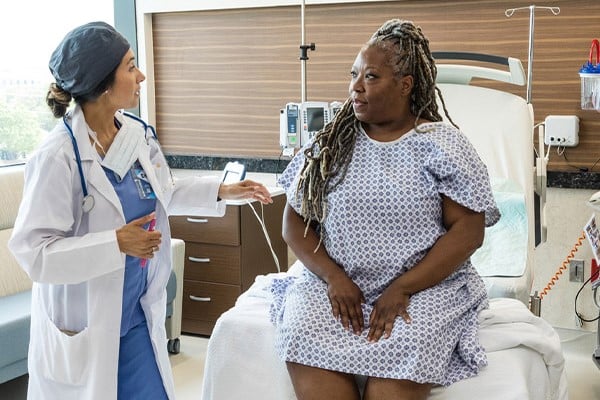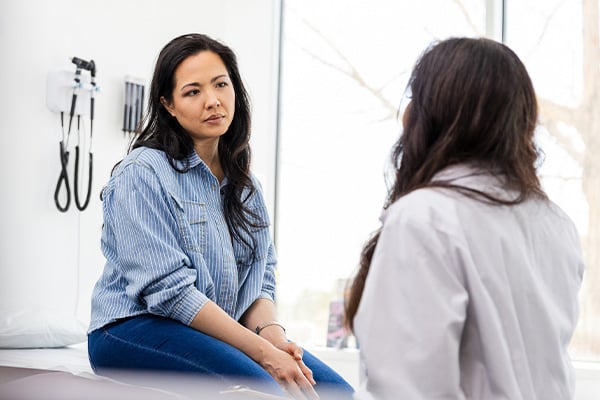Every woman will experience menopause, typically between the ages of 45 and 54. When you haven’t had a period for 12 months—and then for the rest of your life—you’re in menopause.
While the way menopause feels can be different for every woman, no woman has to let menopause symptoms interfere with their life. Don’t “get by” on bad sleep or “grin and bear” gaining weight or dealing with mood swings and hot flashes. These symptoms can impact your overall health—and your quality of life. And some symptoms can give clues to health risks you’ll have later in life.
Talk to your women’s healthcare provider about menopause and the symptoms you’re experiencing. If you want a provider who specializes in this area, make an appointment with a menopause specialist at MetroHealth.
Menopause Clinic
At MetroHealth’s dedicated Menopause Clinic, our specialized team of providers—including family medicine, gynecology, behavioral health and nutrition—offers you an individualized menopausal care plan.
Call 216-778-4444 to make an appointment.

Well-Woman Care
It’s important for every woman—including women going through menopause—to continue annual visits for well-woman care. And it’s never too late to choose a women’s healthcare provider.

Specialty Women's Healthcare
While issues like incontinence and prolapse can happen to women of all ages, it’s more common in women over 50. Don’t let shame or stigma hold you back from getting the help that is available at MetroHealth.

Comprehensive Sexual Health Center
Sex shouldn’t hurt. And, throughout your lifetime—including menopause—you can have a healthy sex life. At MetroHealth, we help women—and men—address issues with sexual function in every stage of life.
About Menopause

During menopause, your body produces less estrogen. But your body doesn’t slow estrogen production in a straight line—it can fluctuate over time. Less or fluctuating estrogen causes most symptoms of menopause.
While most women experience symptoms for 4-7 years, some women experience symptoms for life, making it important to visit MetroHealth for help.
Women from different races and ethnicities can experience symptoms in different ways, too. Black women typically experience symptoms for longer, while women of Asian descent usually have symptoms for a shorter period but with more intensity. And women of Hispanic descent are more likely to experience depression with menopause.
Symptoms Include:
- Hot flashes
- Night sweats
- Trouble sleeping
- Fatigue
- Vaginal dryness
- Heart palpitations
- Mood swings
- Depression and anxiety
- Weight gain
- Thinning hair
- Dry skin
- Dry eyes
- Joint pain
- Increase in inflammatory diseases like rheumatoid arthritis, fibromyalgia and lupus
Symptoms and Risk Factors
It’s important to seek care for symptoms because they can indicate other health risks like:
- Moderate to severe hot flashes can indicate cardiovascular disease
- Reduced sleep is a risk factor for heart disease
- Loss of estrogen is associated with increased risk for heart disease, Alzheimer’s disease, and osteoporosis
Menopause treatment often focuses on symptoms—both finding relief and protecting you against diseases. That’s why you want to seek care at a place like MetroHealth, where we take a team approach to focus on your overall health.
Treatments Include:

Nutrition
Our menopause nutritionists can recommend strategies to help you deal with changes in your metabolism to combat weight gain.

Behavioral Health
We offer non-medication therapies for hot flashes, mood swings, brain fog and sleep. You can also be screened for anxiety and depression—common symptoms of menopause—to see if medication is right for you.

Sleep
Through therapy and lifestyle changes, we can help you get better sleep.

Other medication
We’ll assess if menopause hormone therapy or other medications are right for you. That includes new non-hormonal medication to treat night sweats and hot flashes.
A Word About Supplements

Menopause symptoms can be frustrating. In recent years, influencers—including some physicians—have tried to convince women that specific supplements will “cure” menopause symptoms.
The Menopause Society has released a position statement that says that no supplement currently exists that will treat menopause symptoms better than a placebo. Talk to your provider before choosing to take any supplement.